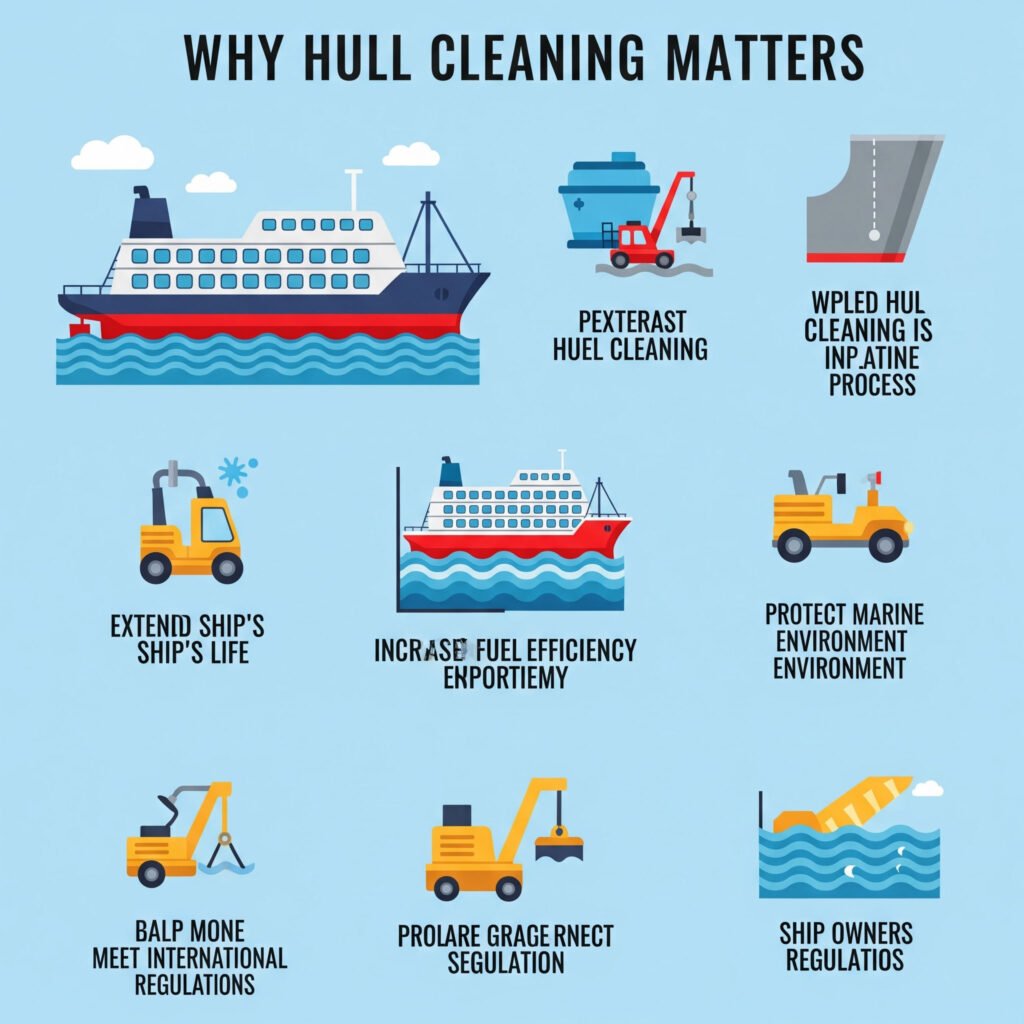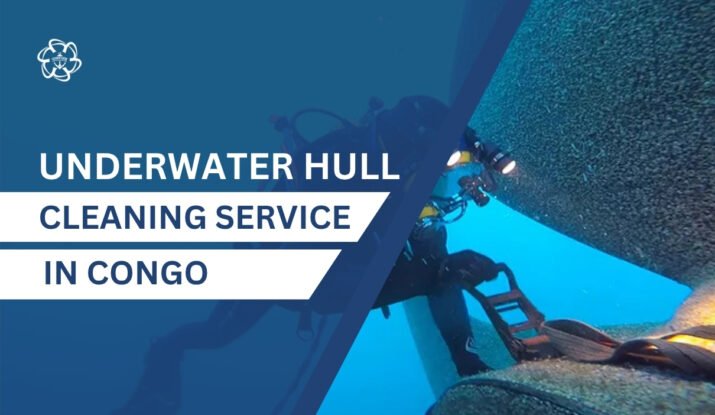Is your vessel’s fuel bill rising unexpectedly? Has your ship’s speed reduced despite proper engine maintenance?
If you’re operating along the Congo River or in the bustling ports of Pointe-Noire and Matadi, the problem might be lurking just beneath the surface. Biofouling—marine growth such as barnacles, algae, and slime—clings to your vessel’s hull, creating hidden drag, increasing fuel consumption, and reducing operational performance.
This article reveals how underwater hull cleaning in Congo can rescue your ship from invisible inefficiencies.
Understanding Underwater Hull Cleaning in Congo and Its Necessity in Congo
What is Underwater Hull Cleaning in Congo?
Underwater hull cleaning in Congo refers to the process of removing biological buildup from a vessel’s submerged hull surface without dry docking. This cleaning is done while the ship remains in the water, minimizing disruption.
Why is it Crucial in Congo?
Congo’s coastal and riverine waters are nutrient-rich and warm—ideal for rapid marine growth. This makes ships especially vulnerable to biofouling. If left unchecked:
- Fuel consumption can spike by 20–30%.
- Speed and maneuverability decline sharply.
- Engine and coating maintenance costs skyrocket.
- Ships risk non-compliance with IMO biofouling guidelines.
The Damaging Effects of Biofouling on Ship Performance
1. Loss of Fuel Efficiency
Biofouling turns a streamlined vessel into a water-plowing machine. Even a thin slime layer can reduce fuel efficiency by 15%, while heavy barnacle buildup can demand 30% more fuel.
Think of it like dragging a parachute underwater—it’s that much resistance your engines must overcome.
2. Reduced Maneuverability
In narrow or congested ports like Matadi, precise navigation is vital. Biofouling disrupts smooth water flow, making ships sluggish and harder to control during docking, increasing risk and port charges.
3. Accelerated Wear and Tear
Biofouling acts like sandpaper on your hull coatings. Over time, it strips anti-fouling layers and damages equipment like sea chests, sensors, and propellers, leading to frequent, expensive repairs.
“A fouled hull is like running a marathon in mud-covered boots.”
Advantages of Underwater Hull Cleaning in Congo
1. No Dry Docking Required
Dry docking can drain both your time and money. Underwater hull cleaning in Congo eliminates this hassle. Your ship stays in the water, minimizing downtime while maintenance gets done.
2. Environmentally Safe Methods
Eco-conscious providers like Cleanship.co use non-toxic tools and biodegradable techniques that clean without harming marine life or violating environmental standards.
3. Instant Performance Uplift
Immediately after cleaning, shipowners report:
- 10–30% improvement in fuel economy
- Noticeable speed increase
- Enhanced navigational control
“We noticed a 25% reduction in fuel costs after one hull cleaning session in Pointe-Noire,” shares a West African fleet operator.
Step-by-Step Guide: How the Process Works
Step 1: Pre-Cleaning Inspection
Certified divers or ROVs inspect the hull using HD cameras and sonar. The fouling extent is assessed, and a cleaning strategy is outlined.

Step 2: Cleaning Execution
Using non-abrasive brushes, water jets, or magnetic robotic tools, teams clean the hull, propellers, sea chests, and rudders without harming protective coatings.
Step 3: Post-Cleaning Documentation
A comprehensive report with before-and-after footage is delivered. Premium services, like those by Cleanship.co, also include efficiency projections and recommendations.
Step 4: Preventive Maintenance Scheduling
To prevent future buildup, a customized cleaning schedule is proposed based on the vessel’s route and time in tropical waters.
Why Choose Congo as Your Cleaning Hub?
Strategic Geographic Advantage
Pointe-Noire is a regional maritime hub—an ideal spot to optimize your vessel before long transits. Cleaning here helps avoid performance drops in international waters.
Reduced Costs
Why wait for European or Asian ports where cleaning is pricier? Getting it done in Congo means lower labor costs, faster turnarounds, and less downtime.
Stay Regulatory Ready
With IMO and regional regulators cracking down on biofouling, Congo’s cleaning ports help you stay compliant and inspection-ready.
“We prefer Congo for our routine cleanings—it’s affordable, efficient, and strategically perfect,” says the Operations Head of an international logistics company.
Key Features of a Professional Hull Cleaning Provider
Choosing the right service provider is pivotal. What should you look for?
- Global Maritime Certifications – Like those from IACS or local port authorities.
- Eco-Friendly Cleaning Methods – Avoids environmental fines or damages.
- Technology-Driven Services – Use of ROVs, sonar analysis, and AI diagnostics.
- Transparent Results – HD before-and-after video proof, performance metrics.
Cleanship.co stands out for delivering all these with consistency and professionalism in Congo.
“With Cleanship.co, you’re not just cleaning a hull—you’re unlocking the ship’s full performance potential.”
Long-Term Value: More Than Just Cleaning
1. Fuel Cost Savings
A cleaner hull cuts drag, boosting miles per gallon (or tons per liter)—critical for cargo ships that clock thousands of nautical miles.
2. Reduced Carbon Emissions
Lower fuel use equals a smaller carbon footprint. It’s a win-win for the environment and sustainability reports.
3. Engine and System Longevity
Less drag means less engine strain. Your components last longer, and your maintenance bills shrink.
Conclusion: What Lies Beneath Could Be Holding You Back
So, why is your vessel lagging in performance?
The answer might be right under the waterline.
Biofouling is a silent disruptor in tropical maritime environments like Congo’s. But it’s also entirely manageable—with the right maintenance approach.
Underwater hull cleaning in Congo isn’t just a cleaning task—it’s a strategic performance move, a financial safeguard, and an eco-conscious choice.
With certified providers like Cleanship.co operating efficiently across Congo’s ports, there’s no excuse to let marine growth drag your performance down. Optimize your fuel, improve handling, and stay regulation-compliant.
FAQ:
Q1: What is underwater hull cleaning in Congo?
Underwater hull cleaning in Congo is the process of removing marine organisms like algae, barnacles, and slime from the submerged parts of a vessel’s hull, propellers, and sea chests, while the ship remains afloat.
Q2: Why is underwater hull cleaning important in Congo?
Congo’s warm coastal waters, especially around ports like Pointe-Noire and Matadi, promote rapid biofouling. Regular cleaning prevents increased fuel consumption, speed reduction, and costly mechanical stress.
Q3: How often should I clean my ship’s hull in Congo?
Depending on travel routes and water conditions, a cleaning every 3–6 months is recommended. Frequent stops in tropical waters may require more frequent cleaning.
Q4. What types of vessels need underwater hull cleaning in Congo?
All vessel types benefit, including cargo ships, tankers, offshore rigs, fishing vessels, yachts, and ferries.
Q5. Can underwater hull cleaning in Congo be done while my vessel is anchored or docked in Congo?
Yes. The service is designed to be performed while the vessel remains in the water, reducing downtime and eliminating the need for dry docking.


